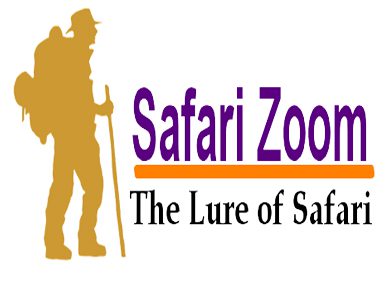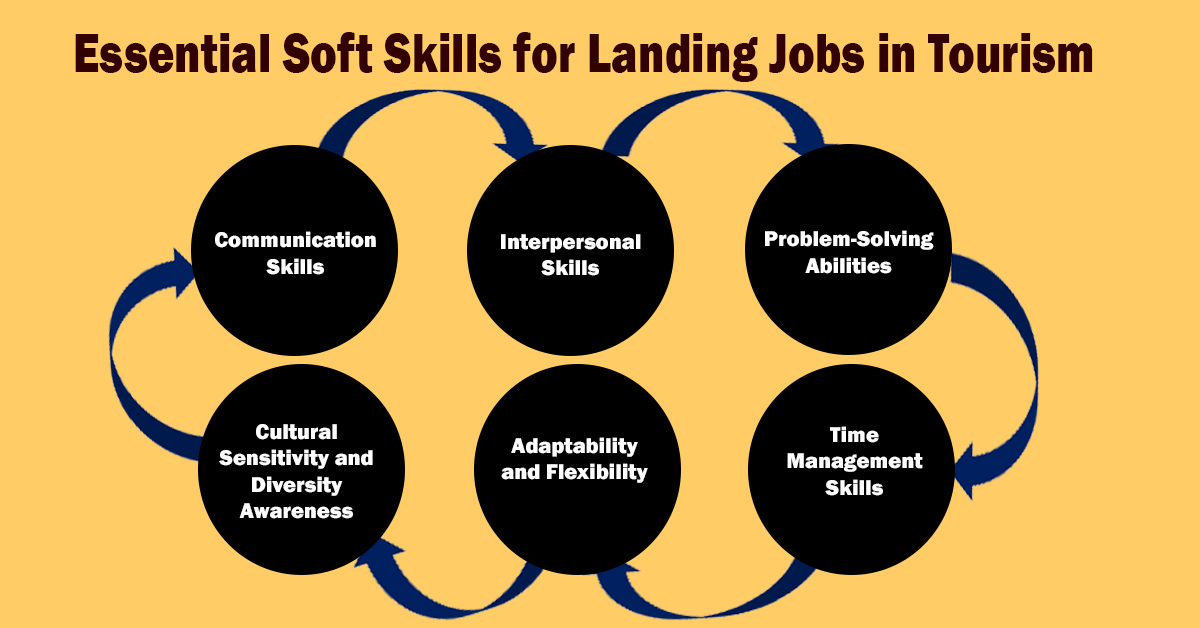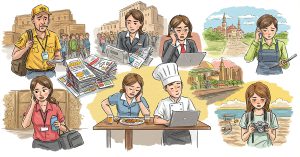The Importance of Soft Skills in Landing Tourism Jobs
Soft Skills in Tourism
Tourism is all about creating memorable experiences; at its core are the people who make these experiences possible. While technical know-how is essential, the soft skills truly set professionals apart in this industry.
These skills define how you interact with customers, coworkers, and partners, and they’re often the deciding factor in landing and excelling in tourism jobs.
What Are Soft Skills?
Soft skills are personal attributes that enhance your ability to communicate, collaborate, and connect with others effectively. Unlike hard skills, which are task-specific, soft skills include empathy, adaptability, and emotional intelligence—qualities that influence how you navigate interpersonal relationships.
Why Are Soft Skills Vital in Tourism?
In tourism, every interaction is an opportunity to shape someone’s experience. Whether it’s greeting a guest with a warm smile, resolving a travel hiccup, or working seamlessly with your team, soft skills ensure a positive outcome. Employers prioritize candidates who can balance technical expertise with a customer-centric approach.
The Rising Demand for People-Centric Skills in Tourism
With the tourism sector rapidly evolving, soft skills are becoming increasingly valuable. Travelers today seek personalized, human-centered experiences. This shift has heightened the demand for professionals who can combine emotional intelligence with technical proficiency.
Key Soft Skills Employers Seek in Tourism
Employers in tourism often emphasize the following soft skills:
Communication Skills
Verbal Communication: The ability to clearly articulate information, whether guiding a tour or assisting a guest with inquiries, is paramount.
Non-Verbal Communication: Body language, tone of voice, and active listening play a significant role in building trust and understanding.
Interpersonal Skills
Building Rapport with Clients: Establishing a connection with customers creates loyalty and enhances their overall experience.
Team Collaboration: Tourism jobs require seamless teamwork. Professionals who can work well with diverse teams are in high demand.
Cultural Sensitivity and Diversity Awareness
The tourism industry thrives on diversity. Understanding and respecting different cultures ensures smoother interactions and fosters inclusivity.
Problem-Solving Abilities
Unexpected challenges are common in tourism, from last-minute itinerary changes to handling complaints. Problem-solving skills allow professionals to adapt and find effective solutions.
Adaptability and Flexibility
Tourism is a dynamic field. Being open to change and quickly adjusting to new circumstances is a vital soft skill for success.
Time Management Skills
Whether it’s coordinating schedules or managing a group tour, effective time management ensures smooth operations and satisfied customers.
Soft Skills vs. Hard Skills: Striking the Right Balance
While soft skills are crucial, they work best when complemented by hard skills.
Defining Hard Skills
Hard skills are technical proficiencies, such as language fluency, software expertise, or knowledge of travel regulations.
How Soft Skills Complement Hard Skills in Tourism
For example, a travel agent needs technical knowledge to book flights but also soft skills to reassure a stressed-out client.
Real-World Examples of Combined Skills
Consider a tour guide who combines deep historical knowledge with engaging storytelling. This blend of hard and soft skills elevates the tour experience.
Developing Soft Skills for Tourism Careers
Building soft skills is an ongoing process that requires deliberate effort and practice. Fortunately, there are several ways to enhance these abilities and make yourself a stronger candidate for tourism jobs.
Enrolling in Professional Training
Many institutions offer specialized training programs focusing on soft skills. From workshops on communication to courses on cultural sensitivity, these programs provide a structured way to develop essential skills.
- Customer Service Workshops: Focus on handling guest interactions and managing complaints effectively.
- Cross-Cultural Training: Learn to appreciate and navigate cultural nuances in a globalized tourism landscape.
Practical Exercises to Build Soft Skills
Improving soft skills involves consistent practice. Here are some effective methods:
- Role-Playing Scenarios: Practice handling hypothetical customer situations to build confidence.
- Public Speaking: Join a speaking club to enhance verbal communication and presentation skills.
- Active Listening Exercises: Engage in activities that require paying attention to details and responding appropriately.
Learning Through Volunteer and Internship Opportunities
Volunteering or interning in tourism-related roles is an excellent way to gain hands-on experience. You can practice soft skills in real-world situations, such as:
- Assisting visitors at tourist information centers.
- Supporting events or cultural festivals.
- Working with tour operators or travel agencies.
The Role of Soft Skills in Enhancing Customer Experience
Customer satisfaction is the cornerstone of the tourism industry. Soft skills play a pivotal role in ensuring that travelers leave with positive impressions.
Meeting and Exceeding Customer Expectations
Tourists often have high expectations. Professionals with strong soft skills can anticipate needs, personalize services, and go the extra mile to exceed expectations.
Example: A hotel concierge who notices a guest’s interest in local cuisine might recommend an off-the-beaten-path restaurant, creating a memorable experience.
Handling Complaints with Empathy
In tourism, mistakes or misunderstandings are inevitable. The key to resolving issues lies in empathetic communication:
- Listen Actively: Give the customer your full attention.
- Acknowledge the Problem: Validate their concerns without becoming defensive.
- Offer Solutions: Provide practical remedies and ensure follow-through.
Creating Memorable Experiences
Every touchpoint in the tourism journey is an opportunity to delight customers. Professionals with creativity and empathy can turn ordinary moments into unforgettable memories.
Success Stories: Professionals Who Thrived with Soft Skills
Real-Life Examples of Soft Skills in Action: Francesca’s Journey in the Tourism Sector
Francesca, a professional in the tourism industry, emphasizes the significance of soft skills in her career. She highlights that empathy, strong relational skills, and active listening are crucial for success in her role. Francesca also notes the importance of having a high level of English proficiency to effectively communicate and attend training sessions. Her experience underscores how soft skills can enhance performance and client satisfaction in the tourism sector
Lessons Learned from Industry Leaders
Many successful tourism professionals emphasize the importance of soft skills:
- Richard Branson (Virgin Group): Attributes much of his success to treating people with respect and fostering positive relationships.
- Airbnb Hosts: Often highlight how their personalized communication and hospitality create five-star stays for guests.
The Impact of Technology on Soft Skills in Tourism
As the tourism industry integrates more technology, the value of soft skills becomes even more apparent. Automation and digital tools cannot replace genuine human connections.
Balancing Digital Tools and Personal Interaction
While technology streamlines tasks like bookings, professionals must balance this with human warmth. For instance:
- Use chatbots for routine queries but follow up with personalized emails.
- Maintain eye contact and a friendly demeanour during in-person interactions.
How Automation Highlights the Value of Soft Skills
Automation handles transactional elements, leaving professionals to focus on relational aspects. This shift makes soft skills even more critical for roles involving customer interaction.
Overcoming Challenges in Developing Soft Skills
Developing soft skills can be challenging, but with persistence and the right approach, anyone can improve.
Identifying Weaknesses
Start by assessing your current skill set. Seek feedback from colleagues, mentors, or performance reviews to identify areas for improvement.
Setting Achievable Goals for Growth
Focus on one or two skills at a time. For example, if you struggle with public speaking, set a goal to practice in small, supportive settings before moving on to larger audiences.
Staying Consistent in Skill Development
Improving soft skills requires consistency. Regularly practice active listening, empathy, and adaptability in both professional and personal settings.
Final words
Soft skills are no longer optional in the tourism industry—they’re essential. As the sector continues to evolve, the ability to connect with others, solve problems, and adapt to diverse situations will set you apart. Developing and honing these skills is an investment in your career, ensuring long-term success in a competitive and rewarding field.
FAQs
- What soft skills are most valued in the tourism industry?
Communication, cultural sensitivity, adaptability, and problem solving are highly prized in tourism roles. - How can I improve my soft skills for a tourism career?
Enroll in training programs, practice role-playing scenarios, and gain experience through internships or volunteer opportunities. - Why are soft skills more critical than hard skills in some tourism roles?
While technical knowledge is necessary, soft skills directly impact customer satisfaction and create lasting impressions. - Can soft skills help in leadership roles within tourism?
Strong interpersonal and communication skills are vital for managing teams and fostering collaboration in leadership positions. - Are soft skills transferable across industries?
Yes, soft skills like empathy, adaptability, and time management are valuable in any field, making them highly transferable.




